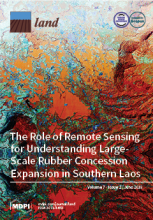Land Library
Welcome to the Land Portal Library. Explore our vast collection of open-access resources (over 74,000) including reports, journal articles, research papers, peer-reviewed publications, legal documents, videos and much more.
/ library resources
Showing items 1 through 9 of 18.Agricultural land is a limited natural resource with increasing economic value.
This article evaluates the impacts of land ownership on the economic performance and viability of rice farming in Thailand, and explores whether they are heterogeneous across different types of farming while using the propensity score matching (PSM) technique.
Women’s rights to land remain a contested issue in Kenya despite the acceptance of the principle of equality of the genders in law. The 2010 Constitution of Kenya clearly provides for the principles of equality and non-discrimination at Article 27.
The ownership of agricultural land has important implications for food systems, the environment, farmer livelihoods, and rural economies, communities, and landscapes.
About 3.5 billion people live in countries rich in oil, gas or minerals.
Statutory recognition of rural communities as collective owners of their lands is substantial, expanding, and an increasingly accepted element of property relations.
This booklet reveals that women only got 103,043 titles representing 10.3 percent, while men got 865,095 titles representing 86.5 percent of the total. The glaring disparity is made clear when looked at against the actual land sizes and titled for women against men.
Implementing Constitutional Land Provisions Now to Enable More Women to Own Land. March 8 is celebrated as the International Women’s Day – an event that celebrates women’s achievements on many scores ranging from the political to the social, and at the same time calling for gender equality.
This report, which focuses on Kenya, constitutes one of four country-wide assessments produced under the overall project.







